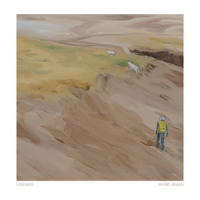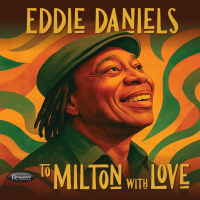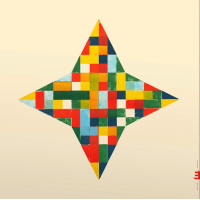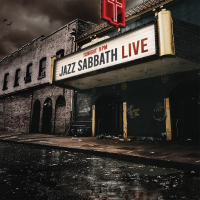Home » Jazz Articles » Album Review » Richie Cole: Cannonball
Richie Cole: Cannonball
The two Charlie Parker influenced altoists never recorded together, although Cole did get to know Adderley casually. Meeting him and hearing Adderley's work with Miles Davis and with his own quintet and sextet had their impact, and Cannonball, long on Cole's to-do list, is the result of that connection.
While more critical listeners might prefer Adderley's work with Davis, most of his fans came from such hits as "Mercy, Mercy, Mercy," a Joe Zawinul composition, "Work Song," written by Adderley's brother Nat and "Dat Dere," by his pianist Bobby Timmons. Adderley was a master at playing first class jazz and at the same time making it accessible to those fans on the periphery of jazz. Ditto Cole.
All selections on this album, except Cole's own composition, "Bell of the Ball," which is a tribute to Adderley, are songs that Adderley recorded. Unlike Adderley, Cole has taken a liking to fuller arrangements. Whereas Adderley mostly played and recorded in a quintet or sextet format, Cole cooked up some simple but effective background arrangements. Using J.D. Chaisson on trumpet and Jerrick Matthews on tenor and on two tunes an extra altoist, the charts have an almost big band feeling, but leave plenty of room for the soloists. The group has an almost Count Basie like feel to it, with clear and concise writing that fills out the canvas without distracting from the main events.
The core of the band is a quintet, featuring trombonist Reggie Watkins as a sparring partner, a really first rate find for Cole. Trombone and alto are a rare pairing in jazz, but Cole prefers the lower pitched trombone to the cornet, which Adderley usually deployed. The rhythm section of pianist Kevin Moore, bassist Mark Perna and drummer Vince Taglieri are solid in support and offer some brief and well conceived solos. But the album really highlights the two horn men.
The album is kicked off by "Del Sasser," a medium tempo major key romp with brief solos by both Watkins and Cole taken from an Adderley recording in the 1960s. "Dat Dere" is a minor key, bluesy tune that has one chorus solos by Cole, who is pungent and soulful, and Watkins gets into a JJ Johnson groove. "Stars Fell on Alabama" is a ballad that dates back to the swing era and is very much a big band type arrangement. Cole is unabashadly romantic, showing off his big vibrato, while pretty much just sticking to the melody. Watkins also gets a few bars in.
"Matchmaker, Matchmaker" has a nicely controlled trombone outing, as well as a brief showing by Moore on electric piano, "Jeannine" is a bluesy Duke Pearson standard that is taken at a brisk tempo. Cole enters slowly and takes a spirited extended solo with occasional ensemble riffs. Then the band in aggregate trades off with drummer Talieri. Watkins plays it out over a simple riff. "Jive Samba," a big hit for Adderley that was written by brother Nat begins with bassist Mark Pena playing a quick intro and then Watkins and Cole slide into the melody. Cole chooses to stay close to the contours of the tune. Guitarist Eric Susoeff has a restrained chorus. Watkins is blustery and robust in keeping with the intent of the tune. There is a bluesy piano by Kevin Moore before Watkins and Cole take it out together, intertwining blues phrases.
"Bell of the Ball" is a catchy Cole original medium tempo swinger. Cole leads off with a smooth boppish solo. Watkins comes through with a lazily swinging retort. Susoeff plays bluesy guitar chorus with the band riffing behind him. "Sack of Woe" is a bluesy tune originally recorded by Adderley's band. Watkins and Cole trade fours with drummer, Roger Humphries, a Adderley sideman who guest starred on this one tune. "Mercy, Mercy, Mercy" gets an almost Basie type treatment and at a much faster tempo than Adderley played it on his famous recording. Cole and Watkins play off each other, intertwining lines. "Save Your Love for Me" is a pleasant ballad that Adderley recorded with the late Nancy Wilson sung in Portuguese by Kenia. It is repeated at the end of the album with lyrics in English.
"Toy" is a tune Adderley recorded with Bill Evans. It is the most up-tempo offering on the date and features one of Watkins best solos. Cole follows up with at transcription Adderley's actual solo. "Azule Serape" is a Victor Feldman composition. Watkins get sandwiched between two brief outings by Cole and then the two take it out together. "Unit 7" finds a touch of Benny Carter in Cole's playing here. There are some really unique phrases and his best solo of the gig. There is also a fine statement by altoist Kenny Blake as the two play off of each other.
Overall, this is a thoughtful, well balanced recording that fits in the library of Cole's recent spurt of releases on this label. Tight arrangements, first rate musicianship and thoughtful selection of songs all contribute to a well deserved tribute of a great contributor of jazz by another superb altoist, who is proving that there is plenty of life left in the bad boy of bebop.
Track Listing
Del Sasser, Dat Dere, Stars Fell on Alabama, Matchmaker Matchmaker, Jeannine, Jive Samba, Bell of the Ball, Sack o' Woe, Mercy Mercy Mercy, Save Your Love for Me, Toy, Azule Serape, Unit 7, Save Your Love for Me.
Personnel
Richie Cole
saxophone, altoRichie Cole: alto saxophone; Reggie Watkins: trombone; Kevin Moore: acoustic and electric piano; Eric Susoeff: guitar; Mark Perna: bass; Vince Taglieri: drums; J.D. Chaisson: trumpet (2-5); Rick Matt: tenor saxophone (2-5); Roger Humphries: drums (8); Kenny Blake: alto saxophone (13); Tony Campbell: alto saxophone (12); Kenia: vocals (10, 14).
Album information
Title: Cannonball | Year Released: 2018 | Record Label: Richie Cole Presents
Tags
PREVIOUS / NEXT
Support All About Jazz
 All About Jazz has been a pillar of jazz since 1995, championing it as an art form and, more importantly, supporting the musicians who make it. Our enduring commitment has made "AAJ" one of the most culturally important websites of its kind, read by hundreds of thousands of fans, musicians and industry figures every month.
All About Jazz has been a pillar of jazz since 1995, championing it as an art form and, more importantly, supporting the musicians who make it. Our enduring commitment has made "AAJ" one of the most culturally important websites of its kind, read by hundreds of thousands of fans, musicians and industry figures every month.




















